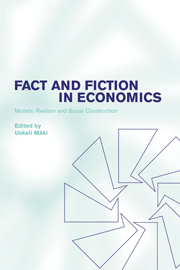Book contents
- Frontmatter
- Contents
- Notes on the contributors
- Preface
- I Introduction
- II Setting the scene
- III Economic models and economic reality
- IV The constitution of economic reality
- 11 Rational choice, functional selection, and “empty black boxes”
- 12 The reality of common cultures
- 13 Collective acceptance and collective attitudes: on the social construction of social reality
- 14 Hayek and cultural evolution
- 15 Putting evidence in its place: John Mill's early struggles with “facts in the concrete”
- V The institutions of economics
- Index
- References
12 - The reality of common cultures
Published online by Cambridge University Press: 22 September 2009
- Frontmatter
- Contents
- Notes on the contributors
- Preface
- I Introduction
- II Setting the scene
- III Economic models and economic reality
- IV The constitution of economic reality
- 11 Rational choice, functional selection, and “empty black boxes”
- 12 The reality of common cultures
- 13 Collective acceptance and collective attitudes: on the social construction of social reality
- 14 Hayek and cultural evolution
- 15 Putting evidence in its place: John Mill's early struggles with “facts in the concrete”
- V The institutions of economics
- Index
- References
Summary
Introduction
Uskali Mäki's brand of scientific realism is, in his words, “hermeneutically enlightened” (see Mäki 1990). This chapter is concerned with whether scientific realism can survive the embrace of hermeneutics. The potential cause for concern is easy to see. Once it is conceded that the social world comprises people who interpret their place in that world, it seems that the relation between theory and reality so changes that the very idea of “science” is liable to alter beyond recognition and even possibly disappear. In particular, when theories help structure people's interpretations, the theories help shape the reality of the social world rather than report on it. Thus what seems like a bit of “enlightenment” can quickly turn into the social construction of reality (i.e. the social destruction of Reality with a capital R); and from here it is but a familiar short step to a thoroughgoing relativism as “facts” spin into “fictions.”
I argue here against this concern over the descent into relativism. This is not because I side with the claims of relativism; rather I argue that hermeneutics is not the first step on the slippery relativist slope (and so I aim to lend succour to Mäki). While the hermeneutic turn may loosen reality's potential grip on theory, reality remains a source of friction. At the least, any theory concerning an aspect of the social world must be consistent with the fact that people are interpretative.
- Type
- Chapter
- Information
- Fact and Fiction in EconomicsModels, Realism and Social Construction, pp. 257 - 268Publisher: Cambridge University PressPrint publication year: 2002



